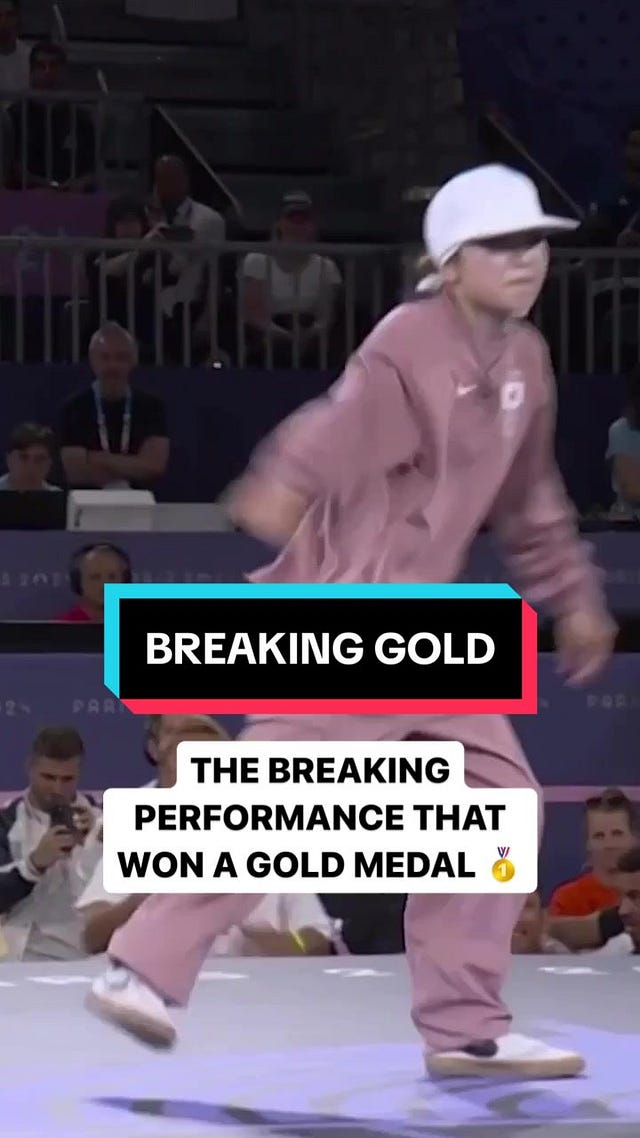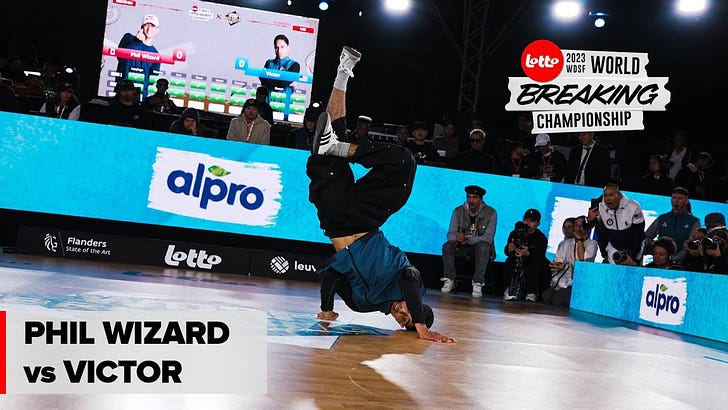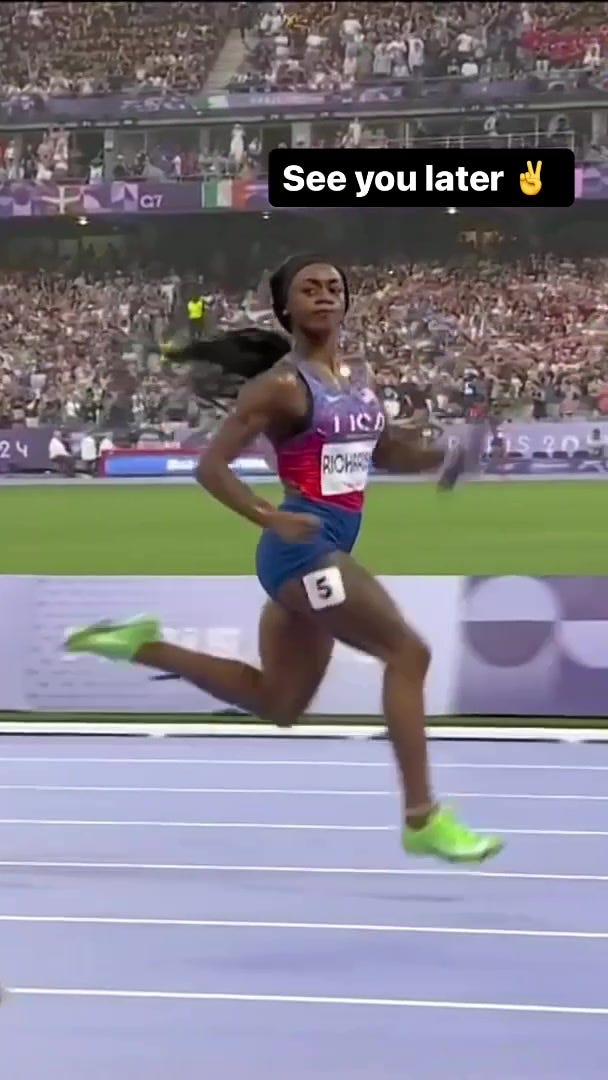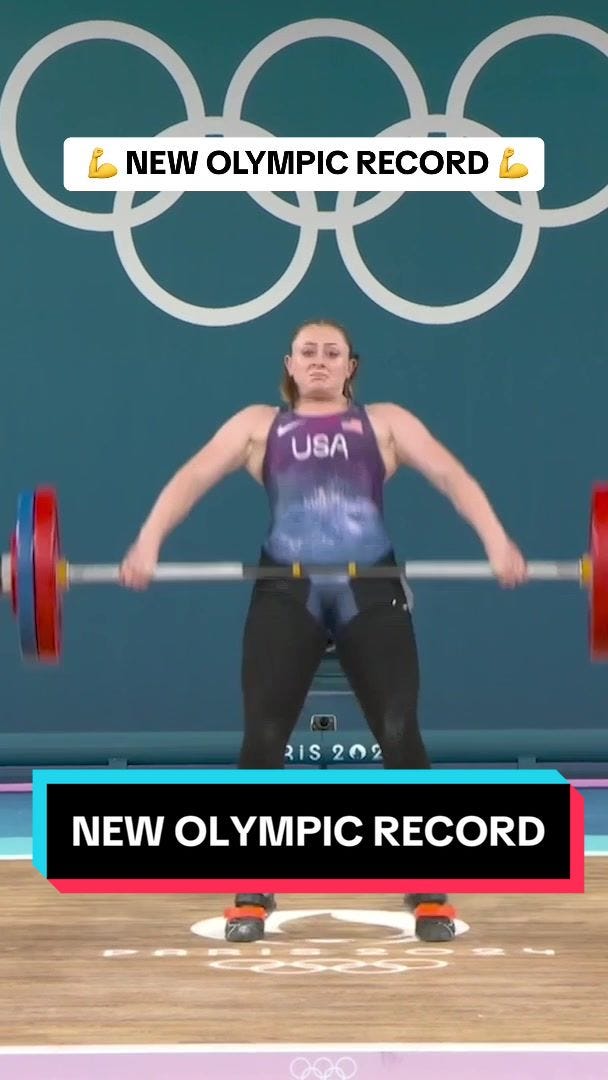Rings Roundup, Day 14: The Breaker who Broke Olympic Breaking
Breaking made its Olympic debut Friday—and its already shaky Olympic future got even shakier after the worst breaker in the Olympics went viral. (Plus, weightlifting gold and another relay DQ.)
We’re at the All Bangers point of the Olympics. A solid chunk of the remaining events are gold medal matches in team sports like handball and water polo—and Team USA has teams going for gold in men’s basketball, women’s basketball, women’s soccer, and women’s volleyball. We’ve also got a much closer gold medal race than I previously let on—China currently leads by one, so Team USA HAS TO WIN ALL THOSE GOLD MEDAL MATCHES. (The sportsbooks still have Team USA favored to win the most medals, but it’s gonna be tight.)
Let’s hand out some Olympic rings!
0 Rings: The Breaker Who Broke Breaking
A common Olympics comment is that they should add a random normal person into the mix to demonstrate the difficulty of the event. Well folks, we finally got one—and it might end up permanently damaging the sport she tried to participate in.
Yesterday was the debut of Olympic breaking, by far the sport you were most interested back when I asked which sports you wanted previewed. The competition was won by Japan’s B-Girl Ami, who also won the 2022 World Games breaking competition.
But the most talked-about competitor of the day was Australia’s B-Girl Raygun—a 36-year old college professor named Rachael Gunn. She rolled around on the floor like my dog after she gets wet. She did a move called “the kangaroo” where she kinda shaped her body like a kangaroo, and no way please tell me she didn’t do the sprinkler in the Olympic breakdancing competition OMG SHE DID THE SPRINKLER IN THE OLYMPIC BREAKDANCING COMPETITION. Friday was supposed to be a celebration of breaking, but Raygun’s performance felt like a mockery.
 Tiktok failed to load.
Tiktok failed to load.Enable 3rd party cookies or use another browser
Raygun was the only dancer in the competition who did not receive a single vote to have won a single round by any of nine judges in any of her 3 battles, resulting in a combined score of 54-0. I don’t want to be too mean to Raygun, but I think she may have done irreparable damage to the future of Olympic breakdancing. Allow me to explain.
The first thing you’re wondering is: How did Raygun get into the Olympics? It’s a reasonable question. There were 17 Olympic breaking spots, and Raygun placed 73rd and 64th at the last two World Championships. But like most Olympic sports, qualifying spots are reserved for athletes from each continent—including the smallest continent, Oceania. In most sports, the Oceania spot works out fine, because Australia and New Zealand invest heavily in Olympic sports programs and considerably outperform their population size.
But they aren’t going to invest much in one-off sports like breaking, so someone with Raygun’s skill level was able to win the Oceania qualifiers and go to the Olympics. She looks a bit more skilled and less gimmicky than she did in Paris, but it’s still worlds away from what the medal contenders were doing.
The second/third/fourth-place finishers behind Raygun at her qualifying event later tried earning Olympic spots at the last-chance Olympic Qualifier Series event in Shanghai… and finished 34th, 35th, and 37th out of 39 competitors. Raygun is like the 16-seed who made the NCAA tournament by winning the worst conference in college basketball… except in this case, it’s the first NCAA Tournament ever, and everybody is using videos of her bricking layups and airballing threes as evidence there shouldn’t be another NCAA Tournament.
If breaking were a permanent Olympic sport, it could have some iffy competitors while growing across the globe. But as I wrote about in my breaking preview, the sport is not guaranteed to appear in future Olympics.
An American's Guide to Olympic Breaking
This is part 8 of RINGS RODGE, a roughly 15-part series where Olympics obsessive and journalist Rodger Sherman breaks down a different sport every day heading up to the 2024 Paris Olympics. You can probably get serious previews of the most popular sports on other sites… here, we’re doing unserious previews of sports that aren’t regularly on TV in betwee…
The sport was snubbed by the LA 2028 committee, meaning they’re in the same boat as dozens of worthy sports trying to get into the Olympics. (Ultimate frisbee! Bowling! Parkour! And many more!) Breaking’s transient Olympic status meant that the breaking competition in Paris was a make-or-break (pun) moment for the sport’s Olympic future. They’d need an exciting competition that ran smoothly, and a strong positive reaction from viewers.
Instead, people are talking about Raygun. The clips of her performance surely reinforce what so many already believed about Olympic breaking—that it’s amateurish, cringeworthy culture-vulturing rather than a legitimate sport worthy of a spot on the Olympic program.
That would make it hard to convince any future Olympic host committee to include breaking… but the 2032 Olympics are specifically in Brisbane. The Aussies are going to want to pick sports which allow Australia to represent themselves well, and perhaps have a chance of medaling—not sports where Australia will score zero points and be an international laughingstock.
After being turned down by LA, the people in charge of international breakdancing have stressed the importance of selling the Brisbane committee on including breaking. The breaking people are going to spend the next 3 years creating a perfect PowerPoint presentation about the sport’s culture and accessibility and diversity and social media engagement metrics and sustainability, and then someone is going to raise their hand and say “hey, isn’t this the sport where everybody made fun of the Aussie girl who looked like a dying fish?” And then it’s DOA.
I like breaking. The skill and style are off the charts, and the head-to-head format is easy to understand and legitimately entertaining. But the uphill battle to have a Breakin’ 2 is going to be even harder now. Olympic breaking just got here, and it feels like it’s already over.
7 Rings: Sha’Carri’s golden moment
It seemed like Sha’Carri Richardson would vault to superstardom at the 2020 Olympics after winning the 100-meter dash at Team USA’s Olympic trials, pulling from the field with her bright orange hair blazing behind her. But she was DQ’ed for marijuana use. (I still can’t believe this happened in 2021. They sell weed on apps now!) Then it seemed like her leap would come in this year’s 100-meter dash, a year after winning the world championships. But she was shocked by St. Lucia’s Julien Alfred, taking silver instead.
But on Friday, Sha’Carri wasn’t going to let anybody stop her. The women’s 4x100 relay team was trailing heading into Richardson’s anchor leg—surprising, considering Team USA’s 4-woman team had three of the top five finishers from the 100-meter event and the rest of the teams in the final only had one combined. But Sha’Carri ran a 10.09, the fastest time of any anchor, to erase a .17-second deficit and win the gold for Team USA. She gave a biiiiiiiiig head-turn to stare at her opponents as she passed them by, the type of glare typically only used by the Road Runner when zooming past Wile E. Coyote.
This should’ve happened in Tokyo—I still don’t get why USA Track and Field kept her off the relay roster in 2021, which was still allowed in spite of her positive test—but that late surge was worth the wait.
6 Rings: A LIFT SAVE AND A BEAUTY!
You might think weightlifting has two possible results: The person either lifts the weight, or they don’t. But as Team USA’s Olivia Reeves, a single lift can feature a novel-length series of twists and turns. Reeves won a historic gold medal for Team USA after snatching an Olympic record 117 kg (that’s 257 pounds), but she DID NOT make it look easy:
Reeves got the bar over her head and immediately began skittering backwards, nearly reaches the back edge of the competition surface. But she fights hard, gains her balance, and keeps the bar above her head. The judges don’t particularly care about all that foot movement—you just need to keep your arms straight after the bar goes above your head.
Reeves is the first American weightlifter to win a gold medal since 2000, just days after Hampton Morris became the first American man to medal since 1984. She benefitted from the way Olympic weightlitfing rosters are set: the world recordholder in the 71 kg weightclass is China’s Liao Guifang, but each country is only allowed six total weightlifters across 10 potential weight classes and China focused on other categories. It looks like they might go 5-for-6 on the lifters they chose, so they probably aren’t too mad.
4 Rings: “Imagine”
The women’s beach volleyball match was oddly contentious for one of the Olympics’ chillest sports. In the closing moments of the deciding third set between Canada and Brazil, all four players from both teams met at the net to shout and point at each other. (I enjoyed the rarely attempted “hold hands with the person you’re yelling at” segment of the beef—it requires an incredibly level of Arguing to execute this move..) The umpire had to descend from his umpiring chair and issued yellow cards to Brazil’s Ana Patricia and Canada’s Brandie Wilkerson, a stunning development because I didn’t even know there were yellow cards in beach volleyball.
There was a tense moment after the players went back to their respective sides—and then the stadium DJ decided to play John Lennon’s “Imagine.” The players started smiling and laughing as the whole crowd broke into song. (One thing I’ve noticed these Olympics—the French are really good at stadium-wide singalongs.)
“Imagine” has become something of an Olympic anthem, even though the lyrics explicitly state “imagine there’s no countries” instead of “imagine there are still tons of countries but they all meet up every couple of years to play each other in beach volleyball and breakdancing.” It’s been played at every opening ceremony since 2018 after previously appearing in 1996, 2006, and of course the 2012 London games. But those sorts of sappy musical moments normally stay within the ceremonies rather than busting out into the actual competition.
It’s the type of moment the IOC would bottle if they could—simmering sports emotions diffused when the athletes remember the Olympics are about how we can build a better world if we want to. Of course, they’re probably gonna zap that video from the internet anyway because it wasn’t shared by one of the IOC’s broadcast partners, so enjoy it while you can.
3 Rings: “The Worst Thing I’ve Ever Done”
Friday was the men’s 10k open water swim, a favorite event for some of the most disturbed individuals on the planet. Not only does the marathon swim involve swimming as hard as you can for two straight hours, this year’s event was in the Seine River. That carries the E. Coli concerns we talked about with the triathlon, but also makes it significantly more grueling than past events held in bays or lakes, since the river has a significant one-way current.
Explaining the brutality of the event was Ireland’s Daniel Wiffen, the winner of gold in the 800m freestyle and bronze in the 1500m. He’d never actually done a 10k swim, but if you hit certain times in those two pool events, you’ve proved your mettle as a distance swimmer in the eyes of the Olympics and auto-qualify for the 10k. “It’s probably the worst thing I’ve ever done,” Wiffen told Irish TV, elaborating on how he got smacked in the head by his competitors and is never going to do it again.
My pro tip for covering international sporting events… always interview the Irish athletes. I don’t speak any other languages and the Americans receive media training on how not to say anything revealing while the Irish don’t mind having a bit of the craic after competing. (An Aussie or Kiwi will do in a pinch. Avoid the Brits.) In Paris, that’s also been a good strategy for interviewing winners: Ireland has won four gold medals after winning just three gold medals from 2000 to 2020.
2 Rings: A dominant rhythm gold
One of the most dominant performances of the Olympics came in the individual all-around rhythmic gymnastics competition. Rhythmic gymnastics has four apparatuses: the hoop, the ribbon, the ball, and the clubs. In all-around competitions, your scores on the various apparatuses are combined. At last year’s World Championships, Germany’s Darja Varfolomeev won the gold medal in the all-around… and also won the gold medal in every individual apparatus.
The Olympics doesn’t give out gold medals for the best performer with each item—if they did, Darja would be the new Simone Biles. In the all-around competition, she had the best score with the hoop, the ball, and the clubs, finishing second with the ribbon by .05 points. In 2008, Russia’s Evgeniya Kabaeva won all four—I guess the differences between the various implements are smaller than the differences between, say, swinging by your arms on the uneven bars and sprinting into a trampoline on the vault.
-1 Rings: Another relay DQ
Every four years, Team USA brings the fastest 4x100 men’s relay team to the Olympics… and they haven’t won a medal since 2004. It’s the strangest streak in the world: A nation that has figured out the hard part of relay racing (having four elite sprinters from the same nation) but keeps screwing up the easy part (passing the baton.)
The American team was expected to win the gold in the men’s 4x100, but a botched handoff caused Team USA to post a terrible time before being disqualified. The issues came on the exchange between starter Christian Coleman and second runner Kenny Bednarek.
If you watch closely, you can see Bednarek takes off way ahead of any of the other runners on his leg. Bednarek ends up way too far ahead of Coleman to make the handoff, so he essentially stops running, and at that point, the race was already over for Team USA. Coleman flies past Bednarek and eventually makes the handoff outside the exchange zone, leading to a DQ.
It is, remarkably, the fourth time in the last six Olympics that the American men’s 4x100 have been disqualified. They had the same “baton pass outside the zone” violation in 2016 and dropped the baton in 2008. In 2012, they won silver, but that was eventually turned to a DQ due to Tyson Gay’s doping violations. They were also DQ’ed at the 2005, 2009, 2011, 2013, and 2015 world championships. (The women’s 4x100 was DQ’ed at the 2004 and 2008 Olympics, but has now won three of four gold medals sandwiched around a silver.) In 2020, Team USA wasn’t DQ-ed, but a poor exchange in their heat ruined their time and Team USA placed sixth, missing the final.
It makes sense that track athletes consider relays a secondary priority. They’re generally individual athletes who train in different parts of the country, and are then asked on rare occasions to give their friend a stick at high speeds. But those issues should be a problem for every country. the sheer number of Team USA screwups indicates an organizational disinterest in focusing on winning the relays—a vibe generally confirmed by Team USA at the Tokyo Olympics, when several members of the team said they hadn’t practiced much, if at all. It seemed like the easiest thing in the world to fix—hire a good relays coach! Make sure the team gets together to practice handoffs!
And for a second there, it seemed like Team USA had fixed it. They won silver at the 2022 world championships and gold in 2023. They won at the World Relays in the Bahamas this year. They had the best time in the world this year, and posted the best time in the preliminary heats. They had three of the fastest 11 men in the world on their team. All they had to do was complete the handoffs.
They didn’t. As it turns out, their time from the prelims (37.47) would have been good enough to win gold.










It’s just dawning on me here, but bowling should 100% be an Olympic sport. Just like pool and its associated stick games. And darts. There should be an Olympic arena sized pub and it should include all pub sports.
"It makes sense that track athletes consider relays a secondary priority. They’re generally individual athletes who train in different parts of the country, and are then asked on rare occasions to give their friend a stick at high speeds. But those issues should be a problem for every country"
It's actually much worse than that. A big reason the US is so good in track - besides being huge and rich and having a lot of good athletes - is that unlike basically everywhere else in the world where you have to decide you want to join a track club, every high school in the country has a track team. And everyone who is good from those teams then goes and runs on college track teams (and the really good ones of those have pro-level training). And every single meet those high schools and colleges run have relays. American sprinters have WAY more relay experience than anyone else in the world.
A Texas high school team - four teenagers from the same school in the Houston suburbs - ran faster this spring than Liberia ran in the heats. And Liberia qualified as one of the top 16 in the world and had an Olympic 200-meter finalist on the anchor leg.